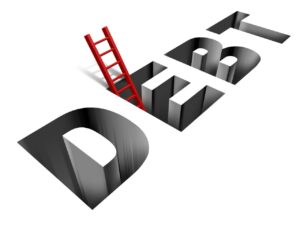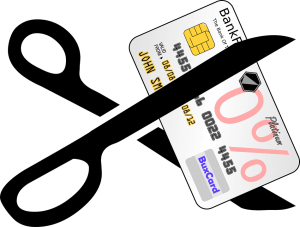There’s a misconception about finances that makes people believe it’s the big money decisions that dictate a person’s financial situation. For example, having lots of money to invest or buy a house.
There’s good news and bad news.
The bad news is, most often, it’s not the big decisions, but rather the small daily money decisions that keep someone poor. Even someone making well above average income will struggle financially if they don’t spend wisely. Here’s the catch (AKA the good news). It only takes implementing small, good money habits that anyone can do to have a healthy financial life.
Here is a deeper look at 10 money habits that could unknowingly be keeping you broke—and how to break free.
1. Paying yourself last
One habit that really undermines financial well-being is paying yourself last. This is when all the mandatory expenses (rent, bills, debt, food) drain a bank account dry on payday before saving anything at all. People who pay themselves last will often find themselves perpetually living paycheque to paycheque.
The fix: Prioritize paying yourself by putting money into savings first, then use the rest of the paycheque to live on. A good rule of thumb is to allocate at least 10% of your paycheck into a savings or investment fund, but every little bit helps. Even constantly saving just $10 a week will grow into something substantial over time.
Many people find it helpful to set saving on autopilot. They either have their company allocate the funds into an RRSP or set up an automatic transfer. Transferring savings out of the bank account right away (or bypassing it altogether) means less chance of missing it and spending the money.
2. Underestimating small expenses
The “latte factor” is real. That’s what behavioural economists call seemingly insignificant daily purchases that add up quickly. Those who don’t pay attention to small purchases like a daily coffee or an unused subscription miss out on many opportunities to improve their financial situation, often without even realizing it.
The fix: Luckily, there’s an easy fix to the latte factor. Review bank statements regularly and take note of these seemingly insignificant expenditures. Just being aware of how much money is going toward these things is enough to inspire someone to redirect those funds toward something more financially savvy, like savings or investments.
3. Giving in to temptation
There can be a temptation to define success by way of labels or the cost of something. Another version of this is rewarding yourself for a job well done. While rewarding yourself is great, and everyone deserves to be rewarded, it becomes concerning when the cost of the reward is out of proportion with income. Getting a raise is a perfect breeding ground for these temptations. Many fall into the trap of lifestyle inflation. This is when the extra income goes to the splurge budget, and the person ends up eating out more or buying things they don’t need. These habits drain resources without actively building wealth.
The Fix: An effective fix for this is to reframe what success means to you. Instead of the fancy car or new phone, make saving or investing more your reward. Build on the habit of delaying gratification and invest in assets that grow over time.
4. Carrying high-interest debt
Many individuals fall into the trap of viewing credit cards as a necessary evil or a tool, rather than a financial burden. Paying the minimum amount due on a credit card traps you in a debt cycle. Credit card interest rates, which often hover around 20% to 25%, bleed your finances dry through compounding interest. For example, a $5,000 credit card balance left unpaid can cost about $1,000 to $1,250 a year just to keep it active and up to date.
The Fix: Prioritize paying off high-interest debts as quickly as possible. If you cannot afford to pay for something with cash or a debit card, don’t buy it using credit. Furthermore, aim to keep your credit utilization rate (the amount of credit used versus available) under 30%; getting too close to your limit can severely damage your credit score.
5. Avoiding financial education
Financial health and resilience come from understanding how money fundamentally works. Lacking basic financial knowledge leads to relying on gut feelings or simply following what others are doing. This often creates a cycle of financial difficulty.
The Fix: Make it a habit to regularly consume content about money management. Even small doses of financial education go a long way to changing your relationship with money and your financial situation. That being said, not all financial education is created equal. Make sure to learn from someone who has the expertise to back up what they’re teaching. A couple of key areas to get started with are budgeting, compound interest, and debt management.
6. You do all the hard work
Hard work is important and deserves to be commended, but don’t put all the pressure on yourself. Make your money work hard too. There are two ways to make sure money is earning its keep: not wasting it on unnecessary expenses and putting it toward wealth-building activities like investing.
The Fix: Shift your focus from how much income you bring in to how much your income can bring in for you. This perspective isn’t about not spending, it’s about being purposeful about what you spend on. A course might cost $1,000, but if it opens up an opportunity to use the skills you learned to earn $5,000, it’s money well spent.
7. Failing to plan for tomorrow
One of the biggest hits to financial health is not planning for tomorrow. Life’s curveballs are often expensive. Not preparing for these curveballs typically makes them even more expensive because we end up taking on debt to pay for them. Not having some savings set aside for these unexpected expenses puts you in a very financially vulnerable spot.
Another key element to consider when planning for tomorrow is retirement. Waiting too long to start saving for retirement means missing out on passive income built from compound interest.
The Fix: Make it a priority to build unexpected expense funds like an emergency fund and a sinking fund. It’s recommended to have at least 3 months of income set aside as an emergency fund. Six months is even better. How much you put away for sinking funds depends on your financial goals and needs. Lastly, when it comes to retirement, remember, every dollar saved early is worth far more than a dollar saved later.
8. Making emotional financial decisions
When driven by fear, greed, or other strong emotions, money decisions rarely end well. This includes another last shot at the slot machine or making impulsive, large purchases based on a “limited-time offer”.
The Fix: Always take a step back and make well-informed decisions grounded in helping you reach your goals and live by your values. Further to that, if you indulge in hobbies, ensure they are budgeted for; hobbies should provide relaxation, not financial stress, particularly if they involve taking on high-interest debt (like financing a boat).
9. Neglecting your health and relationships
Poor health is one of the more obscure, but very real, financial drains. Bad health leads to medical bills, lost work hours, and lower productivity. Consider preventive care, such as regular exercise and nutritious food, as a form of long-term savings plan. A plan that helps reduce future healthcare costs and ensures you remain financially productive.
Relationships are another less obvious area that can significantly impact your finances. Dating someone who doesn’t understand or respect money can cause emotional and financial stress, leading to conflict that is often cited as a major reason for breakups and divorces.
The Fix: Prioritize a healthy lifestyle for financial resilience. Ensure financial compatibility or at least mutual understanding with your partner, aligning financial goals and habits to avoid tension.
10. Letting fear or complacency dictate action
Fear of failure, rejection (such as asking for a raise), or investing can keep you stuck in your financial comfort zone. Complacency, such as leaving savings in a traditional, low-interest account earning barely any return, means your money is losing value due to inflation. Playing it safe often results in missed opportunities.
The Fix: Take calculated risks and embrace learning from mistakes, remembering that growth happens outside your comfort zone. Automate your savings and investments to ensure consistent contributions and take emotions out of the equation. Further to that, don’t just rinse and repeat when it comes to your budget. Review it regularly and make adjustments that fit with your current financial goals. This will also encourage another good financial habit, putting more towards paying off debt.
Wrap-up
Breaking these poor money habits is about being mindful, intentional, and strategic with your resources. It can be tempting to think that a big windfall is the sole ticket to financial freedom. In reality, consistent, thoughtful changes have proven to be more effective at changing a person’s poor financial situation.
If part of your plan for adopting good financial habits is paying off debt, our Credit Counsellors can help. They assess your full financial picture and then discuss what the best path to debt relief is for your specific situation.





